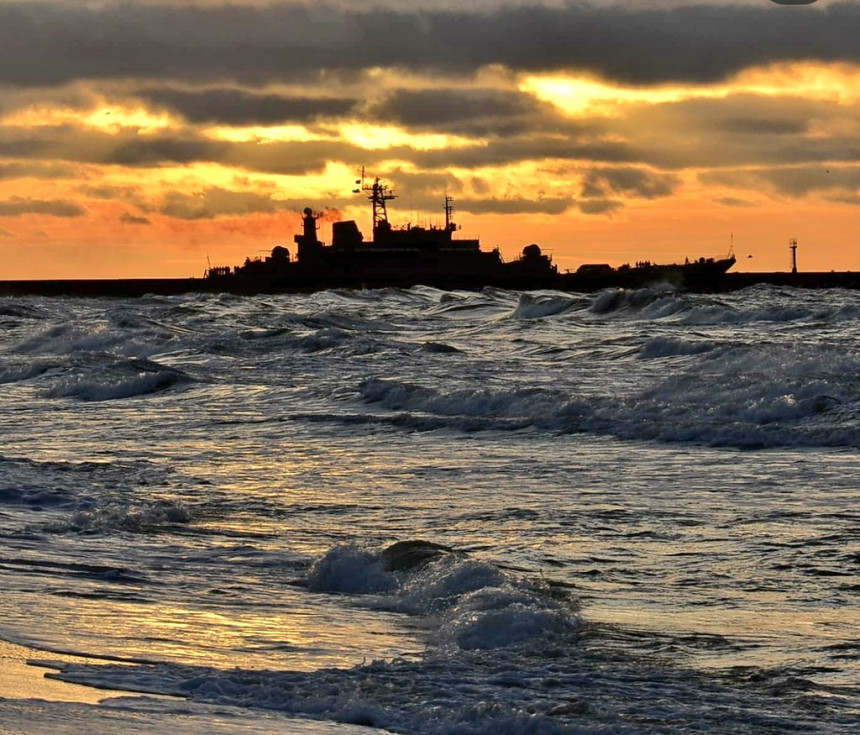De-escalation failed, escalation continues

After the publicly declared failure of the NATO-Russia talks, the two blocs continue to escalate the scale of the potential conflict. Warships are being deployed both in the Baltic Sea and in the Arctic.
Some tens of hours ago, pictures of the Olenegorskiy Gornyak, Georgiy Pobedonosets and Piotr Morgunov were circulated on social networks. These are not Russian oligarchs, but three warships grazing around the Swedish island of Gotland, prompting the Swedes to immediately step up their military presence on the island. The ships were heavily laden, and the accompanying fire-fighting vessel, the Katun, and the sanctioned pipe-laying vessel, the Fortuna, attracted even more attention. And there were the unauthorized drones hovering over Swedish nuclear power stations. At the same time, various activities by both Russian and NATO allies are taking place in the Arctic and, of course, in Ukraine.
Be afraid and expect the worst
The Russians have hypersonic missiles and nuclear weapons stacked up on the Kola Peninsula, while NATO will hold its Cold Response military maneuvers across the Arctic Circle in March. The first allied aircrafts are already on their way to the designated location, the Norwegians report. As usual, this is a planned exercise which in theory has nothing to do with the tensions between NATO and Russia and the possible resumption of war in Ukraine. But in practice, it does, as Russia and Belarus are also going on a joint exercise. This was announced yesterday by the Belarusian news agency Belta. The maneuvers will take place in February near the southern and western borders of Belarus. But already now there are around 100,000 Russian troops, tanks, helicopters, missile systems concentrated on the Ukrainian border. Everything needed for a possible invasion. Last week, the Ukrainian authorities were hit by a major cyber-attack.
The website of the Ministry of Foreign Affairs displayed the message "be afraid and expect the worst" in Ukrainian, Russian and English at the time of the attack,
LETA reports. Ukrainians and Americans have since said that the Russians are to blame, with the Russians saying that they might as well be blamed for bad weather in Ukraine. But that is exactly what they did before the invasion of Ukraine and the occupation of Crimea. They are not there.
Russian polar explorers in the port of Riga
Against this background, any movement in either direction seems suspicious and even the Russian-flagged Polar Pioneer polar research ship moored in the port of Riga raises the question of what kind of polar tourists it is taking around.
As for the recent NATO talks with Russia and the demands it has made, they have been rejected, at least at this stage. Fortunately for Latvia and the Baltic States in general. It should be recalled that the Kremlin demanded that NATO forces and weapons not be deployed in the Member States that joined the alliance after 1997, and that further enlargement - this would apply primarily to Ukraine and Georgia - be refused. The Americans also should Europe leave alone, think the Russians. But the Alliance has said that it shouldn't. To read the full Russian demands to the United States and the NATO alliance, click HERE.
There will be no second-class NATO countries
On Sunday, the North Atlantic Council issued a statement on the situation in and around Ukraine, formally rejecting Russia's demands:
"We are gravely concerned by the substantial, unprovoked, and unjustified Russian military build-up on the borders of Ukraine in recent months, and reject the false Russian claims of Ukrainian and NATO provocations. We call on Russia to immediately de-escalate, pursue diplomatic channels, and abide by its international commitments on transparency of military activities." From the point of view of Latvia's interests, the most important sentence in this statement of grave concern is: "NATO will take all necessary measures to ensure the security and defense of all NATO Allies." Moreover, NATO Secretary General Jens Stoltenberg also verbally confirmed this on Sunday in an interview with Canada's CBS television: the alliance will not turn half of its members into second-class countries that are not entitled to the protection of NATO forces. It is significant that precisely Canada is the lead country of the NATO battle group deployed in Latvia and it is not going anywhere.
There is a lot of talk about a possible war in Europe. Above all, this is talked about by the Ukrainians themselves, for whom war is not just a possibility, but a daily reality since 2014. But for Ukraine, which is at the forefront of the conflict, its European and transatlantic friends are coming to its aid only with generous advice, political and moral support. But not with weapons. At least for now.
*****
Be the first to read interesting news from Latvia and the world by joining our Telegram and Signal channels.
